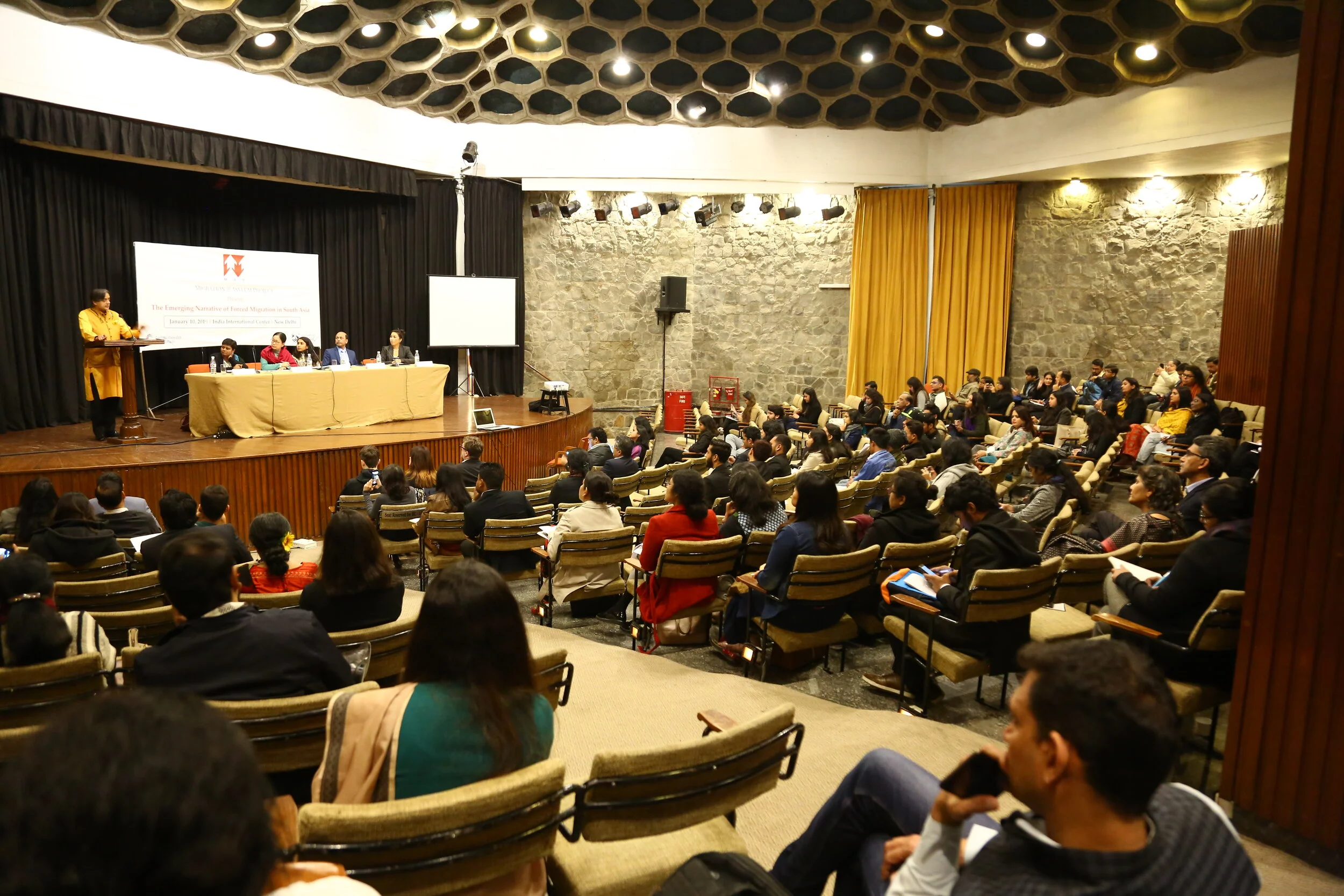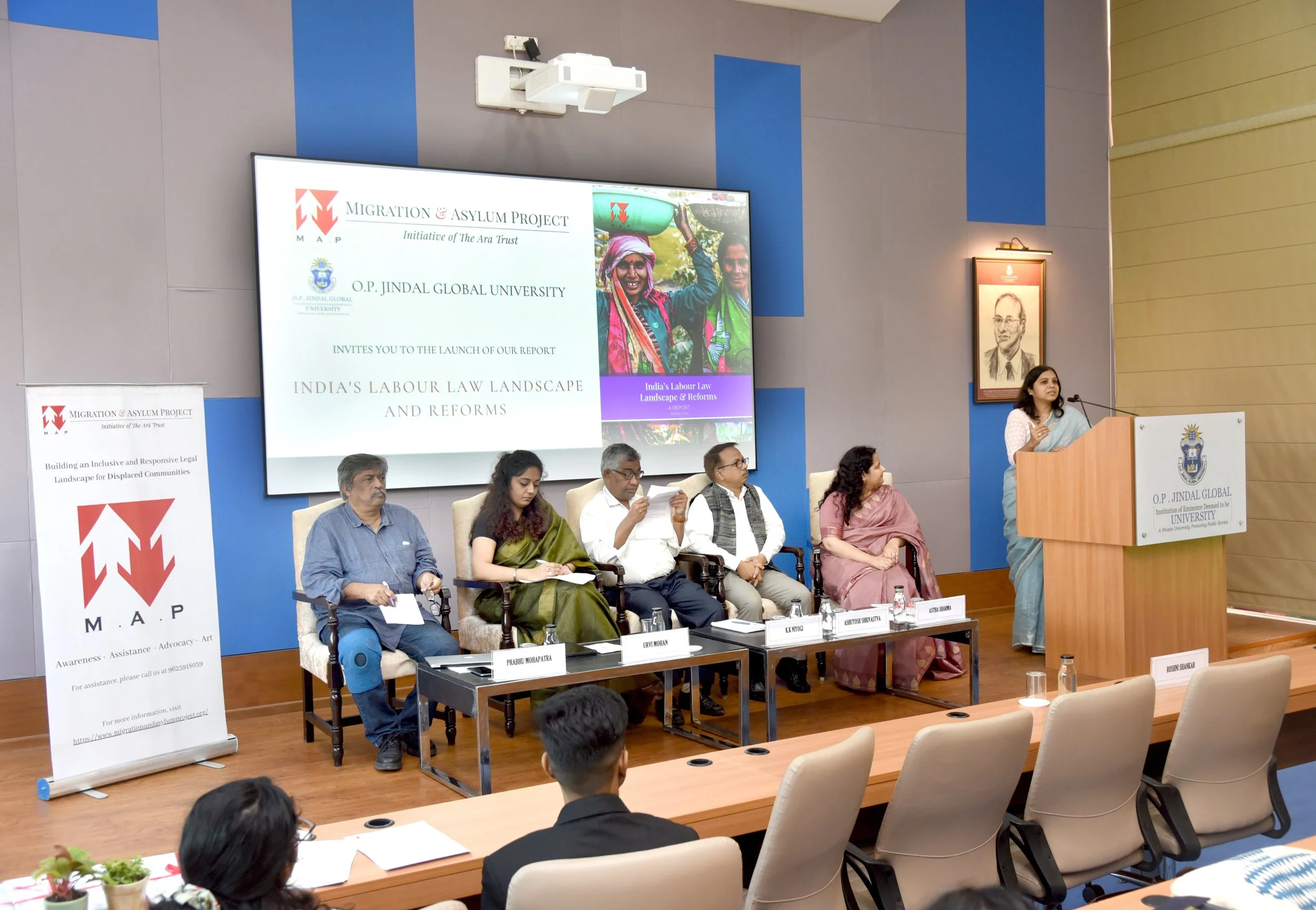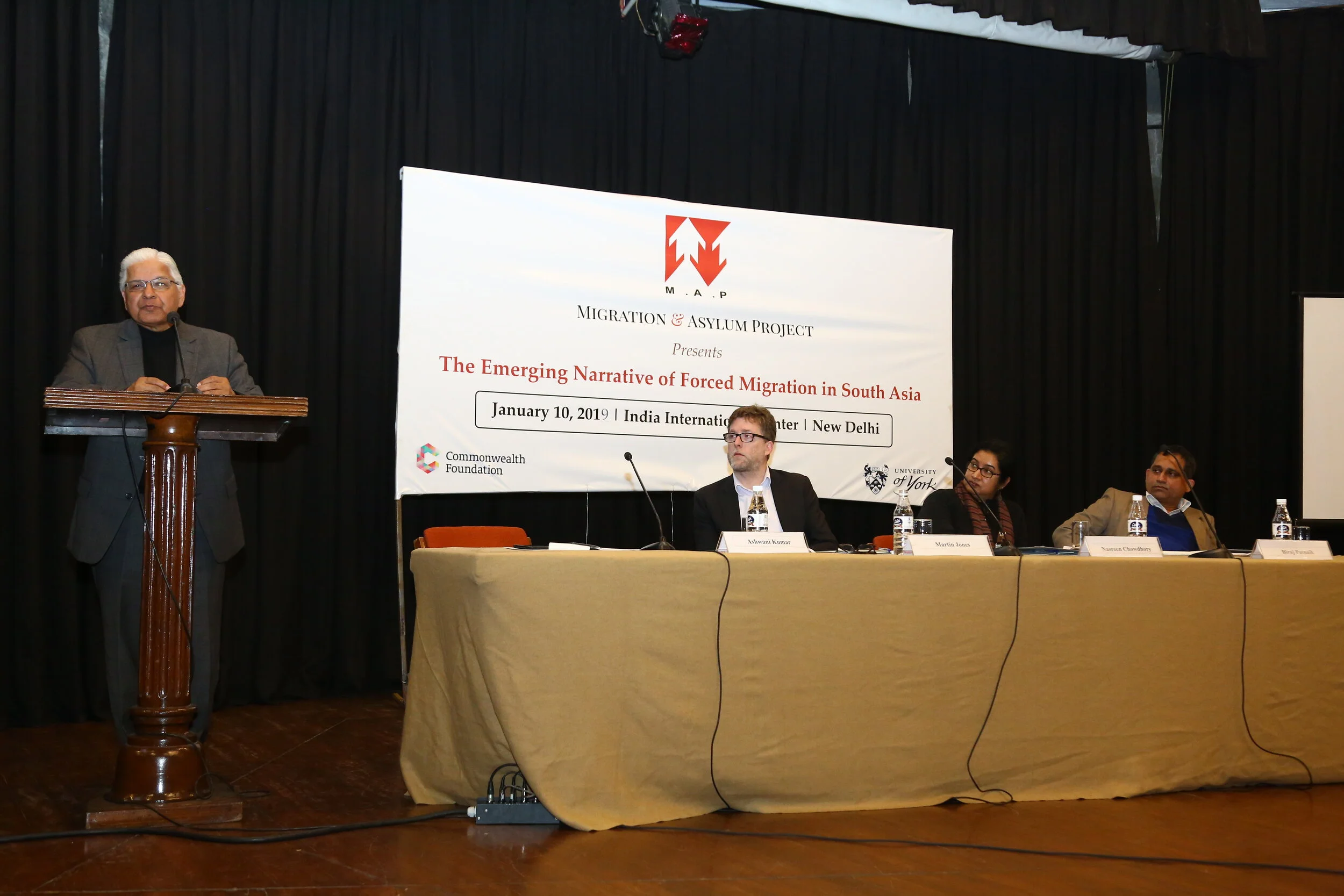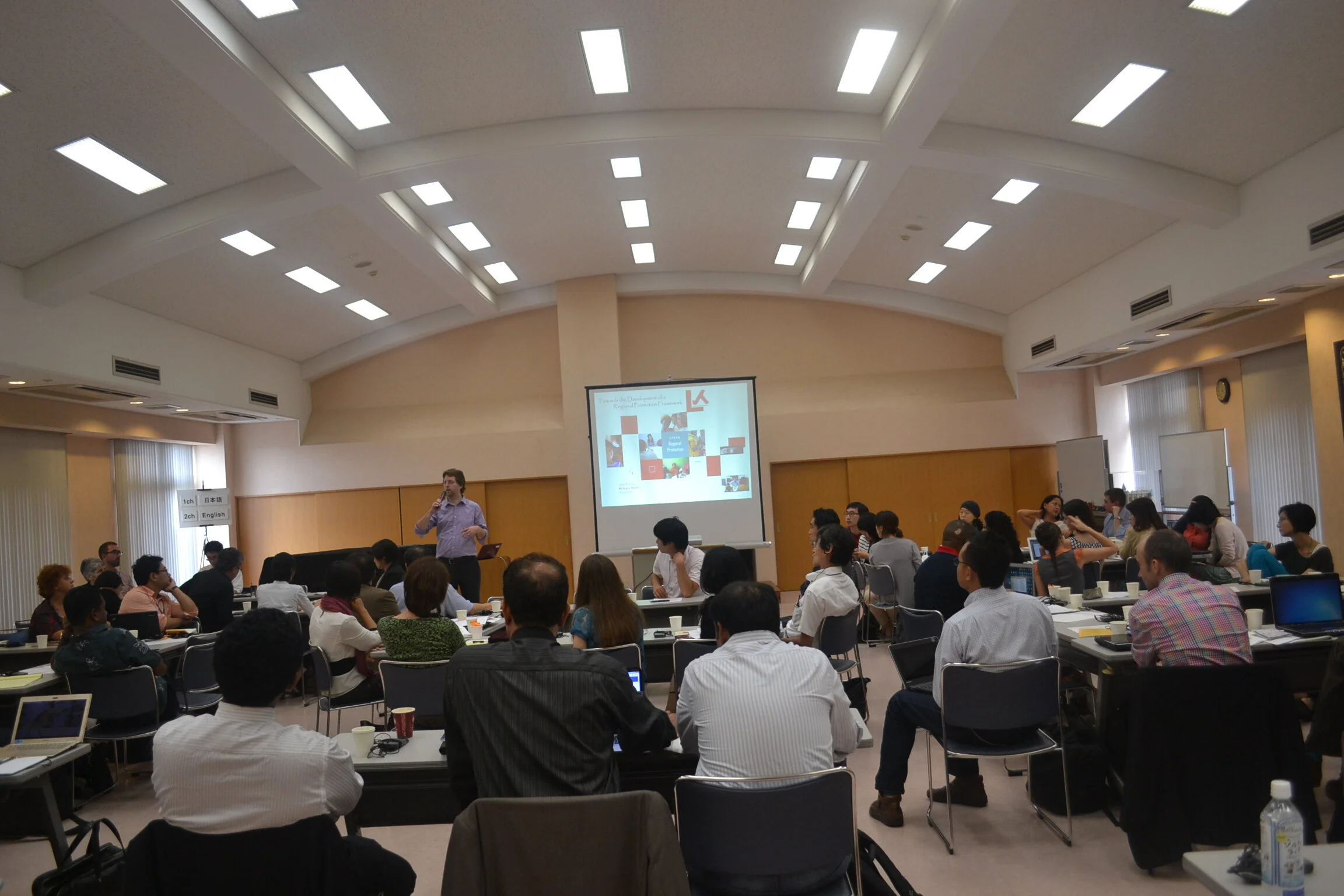
Conferences
Over the years, MAP has engaged with numerous international and local institutions, civil society organisations, as well as with state and central authorities to highlight the concerns of the target population and devise advocacy initiatives and policies that better serve the marginalised communities. These have then been shared on the global platform to propel a cohesive movement focused on securing the rights of refugees and migrants. A few of the conferences organised by MAP can be found here:
February 14 & 15, 2025 Nyaay Sabha: Paralegals and Lawyers as Catalysts for Strengthening Access to Justice
The Migration and Asylum Project (MAP) successfully convened "Nyaay Sabha: Paralegals and Lawyers as Catalysts for Strengthening Access to Justice" in New Delhi, marking the 30th anniversary of the Legal Services Authorities Act. This two-day event provided a critical platform for reflecting on the evolution of India's legal aid institutions, with a focus on the experiences of women duty-bearers and the insights of experienced practitioners. Hon. Justice Anup Jairam Bhambhani delivered the keynote address, emphasizing the constitutional foundations of legal aid and challenging conventional perspectives on its role. A key highlight was the launch of the report, "Justice Within Reach: Paralegal Volunteers in India," which presented findings from surveys of nearly 1,000 PLVs, underscoring their vital role in ensuring access to justice for marginalized communities and offering recommendations for enhancing their impact. Discussions throughout the event addressed systemic challenges within the legal aid framework, including the need for improved training, safety measures, adequate compensation, and greater institutional support. The event reaffirmed the indispensable role of paralegals and legal professionals in strengthening India's legal aid system and fostering a more inclusive and equitable society.
Watch here.
May 4, 2024Bridging the Justice Gap: Empowering the Paralegal Volunteer (PLV) Network
The multi-stakeholder consultation, "Bridging the Justice Gap: Empowering the Paralegal Volunteer (PLV) Network," convened to examine and strengthen the crucial role of PLVs in enhancing access to justice. Hon. Justice (Retd.) Sanjay Kishan Kaul delivered the keynote address, emphasizing the potential of PLVs to bridge the gap between vulnerable populations and legal resources, particularly through mediation and alternative dispute resolution. The event featured a distinguished panel, including Ms. Abha Singhal Joshi, Mr. Ashutosh Srivastava, Dr. Kanta Singh, and Ms. Maja Daruwala, who shared their expertise on the PLV scheme's implementation and impact. Discussions centered on the importance of community integration, capacity building, and institutional support for PLVs, with a focus on transforming the network into a community-driven movement. The consultation highlighted the PLV's role in providing legal awareness, mediation assistance, and pro-bono support, ultimately aiming to empower vulnerable communities and facilitate grassroots dispute resolution.
Watch here.
September 15, 2023Opening Doors to Justice
The multi-stakeholder consultation, "Opening Doors to Justice," hosted by MAP at the India Habitat Centre on September 15, 2023, marked the culmination of a three-year program dedicated to mitigating and preventing sexual and gender-based violence (SGBV) against women, particularly migrant women. Hon. (Retd.) Justice Muralidhar delivered the keynote address, emphasizing the "need to demystify the law" and commending MAP's efforts in facilitating access to justice for SGBV victims. He further advocated for the integration of university law clinics in providing legal aid, highlighting the importance of instilling constitutional values in future legal professionals. The event featured a panel discussion moderated by Ms. Tanima Kishore, with panelists Ms. Seema Bharadwaj, Ms. Kamla Yadav, Ms. Aparna Bhat, and Ms. Neelam Narang, who shared invaluable insights and experiences from their respective fields. Discussions centered on strengthening access to justice for survivors, addressing systemic inadequacies, and fostering a supportive environment for women seeking legal recourse. The event underscored the critical role of civil society, para-legal volunteers, legal professionals, and support structures in empowering survivors and ensuring accountability within the justice system.
Watch here.
Workers, who form a pillar of the Indian economy, are also one of most vulnerable populations in the country owing to lack of adequate legal protection mechanisms. The need to overhaul labour laws has been a central theme in legal discourse ever since Independence, albeit, minimal changes took place over the years. The Ministry of Labour and Employment, drawing from the recommendations of the National Labour Commission (2002), codified 29 existing labour laws into 4 major codes - which was introduced in the parliament in 2019, and enacted in 2020 – bringing about the single largest reform in India’s labour law landscape. MAP’s Migrant Worker team, in collaboration with O.P Jindal Global University, Sonipat, undertook a report launch and panel discussion to delve further into this topic. Our report aims to serve as a handbook/guide for practitioners, researchers, activists, academicians, lawyers in the field of labour rights. The panel discussion on ‘Access to Justice and Labour laws’ brought together our esteemed panel, including labour law historians, advocates, and a member of the Department of Justice, to share their insights on the history of labour movements, the legal pathways available to migrants and ways by which gaps between policy and practice could be filled.
October 15, 2022Panel Discussion: India’s Labour Law Landscape and Reforms
July 16, 2021Panel Discussion: Localizing Solutions to Combat SGBV: Innovative Approaches from South Asia/ South-East Asia
Amongst the most worrying effects of the pandemic has been the alarming increase in sexual and gender-based violence (SGBV) against women and girls. In fact, the UN Women has termed this a ‘shadow pandemic’, prompting the Secretary-General to call on governments to make the prevention and redress of violence against women a key part of their national response plans for COVID-19. The continuing impact of the COVID-19 pandemic, and collapse of traditional service delivery systems owing to various forms of lockdowns and travel restrictions, have deepened pre-existing inequalities and have further distanced the refugee community from the development narrative. All this has necessitated a paradigm shift in the protection ecosystem, towards localized and community-based solutions and first responders, which allow women/girls to access services outside of mainstream institutional frameworks. Within this context, practitioners in South and South East Asia have been working towards piloting and testing innovating programmes and interventions that seek to strengthen and democratize justice/protection systems at the grassroots for refugee women/girls. With speakers from Bangladesh, India and Malaysia, the objective of this event was to bring together practitioners, community representatives, and academics to identify best practices across the broader South/ South-east Asian region that can inform community-led movements, including those pertaining to access to justice, towards building an inclusive and effective protection landscape for SGBV survivors.
Talika Network, an initiative of Migration & Asylum Project conducted a six-month training programme for Para Legal Volunteers (PLVs) registered with the Delhi State Legal Services Authority (DSLSA) from July-December 2021 on “Providing Effective Para Legal Services to Members of Migrant and Displaced Communities.” The trainings aimed to equip PLVs with the knowledge, skills and attitudes required to effectively aid survivors of and those at risk of sexual and gender based (SGBV) belonging to the migrant/displaced communities. Additionally, PLVs were also trained on labour law issues affecting migrant workers, such as recovery of wages and registration of migrant workers. The final training was held in-person at India International Centre where Dr. Meenu Anand, Professor, Delhi University, presided over the closing ceremony and distribution of certificates.
December 13, 2021 Providing Effective Para Legal Services to Members of Migrant and Displaced Communities
The humanitarian crisis in South Asia, combined with the States' reluctance to implement a codified domestic asylum framework and instead rely on ad-hoc policies has left the protection framework with various lacunae and cast further doubt on the future of refugees in the region. Further, the post-Covid era has presented its own set of challenges in working with the community and it is crucial to identify avenues through which we can reinvent service delivery systems. As a first step towards engaging with individuals and organisations engaged in refugee rights advocacy in India, MAP organised this discussion with a panel of academics, civil society representatives and legal practitioners, with experience working on multiple aspects of refugee protection in India and in developing interventions to strengthen the protection framework.
July 16, 2021Panel Discussion: Reflections on Contemporary Issues in Refugee Protection in India: Law & Practice
June 24, 2021Report Launch: Sexual and Gender-Based Violence and COVID-19: A Survey of Six Settlements across Delhi-NCR
MAP organised a webinar for the launch of our report "Sexual and Gender-based Violence and Covid-19: A Survey of Six Settlements across Delhi-NCR’". The report is a first of its kind rapid assessment of migrant communities (internal and refugees) across 6 settlements of Delhi to understand the (a) experiences of these communities with sexual and gender-based violence, (b) the awareness of laws that protect women and engagement with support structures and (c) digital capacity and the potential for digital solutions. Ms Susan Ferguson, Country Representative, UN Women, was the keynote speaker. The launch was followed by a panel discussion.
MAP in collaboration with the Centre for Labour Laws and Livelihood at the National University of Juridical Sciences (NUJS) organised the webinar for the launch of M.A.P's report "Migrant Workers and Access to Legal Pathways: A Case Study of Delhi". The report is a culmination of a six month long study that M.A.P carried out with migrant worker communities in 12 settlements of Delhi to identify the legal challenges they faced, particularly in the aftermath of the pandemic. Hon’ble Justice V. Gopala Gowda (Retired) was the keynote speaker.
February 20, 2021Migrant Workers and Access to Legal Pathways: A Case Study of Delhi
The first in the series of Digital Dialogues, the webinar brought together representatives from various arms of the SGBV response framework to discuss and re-imagine traditional SGBV response delivery systems in the aftermath of the Covid-19 pandemic. The speakers included Ms. Roshni Shanker, Executive Director, MAP, and representatives from prominent CSOs like Shakti Shalini, and MSF India. Ms. Rekha Sharma, Chairperson, National Commission for Women, was the keynote speaker.
January 07, 2021Digital Dialogues Series – I: Addressing Sexual and Gender Based Violence in the Post-Covid World, organized in collaboration with the GNLU Centre for Women and Child Rights
January 10, 2019Conference on Emerging Narrative of Forced Migration in South Asia organized in New Delhi, India
MAP’s first annual conference on forced migration was held at IIC, Delhi. The event was split into two panel discussions. The first Panel discussion, “Financial Inclusion of Refugees as a means of Self-Reliance” focused on the unique barriers to financial services for refugees and the potential avenues available to them. The Panel included experts in the field and also put forth the perspective of refugees who encountered these issues on a daily basis. The second Panel discussion on “The Law of Asylum: Refugee Protection in a Legal Vacuum” discussed realistic solutions to the current refugee protection framework in India. The keynote speaker for the event was Dr. Shashi Tharoor, Member of Parliament.
The webinar kick-started MAP’s flagship Migrant Assistance Innovation Network (M.A.I.N) and included panelists working in the sector to critically analyse the role of law, legal aid and policy in protecting the rights of migrant workers in India. The speakers included representatives from ILO, Ajeevika Bureau, NUJS Kolkata, and DLSA.
September 18, 2020Webinar on Legal Protection for Migrant Workers
MAP frequently engages with UNHCR and its partner organisations as well as other UN agencies and, is a regular invitee to the UNHCR Annual NGO Consultations held in Geneva, Switzerland. MAP’s legal representation model has been lauded as being amongst the most successful and the organisation has been invited as an Expert Panelist to various conferences focusing on forced displacement and other relevant subject matter.
UNHCR Annual NGO Consultations
February 11, 2016Panel Discussion on Conflicts are not Gender Neutral: How to Protect and Empower Women and Girls
The panelists included representatives from UN Women, Médecins Sans Frontières (MSF), UN High Commissioner for Refugees (UNHCR), Roshni Shanker, and members of Indian civil society. The event had over 100 participants from the humanitarian and academic sectors.
Asia Pacific Refugee Rights Networks (APRRN)
MAP regularly collaborates with APRRN and its member organisations comprising of various civil society organisations, human rights defenders and other individuals to sustain the discourse on issues surrounding forced migration in the broader Asia-Pacific Region.
















